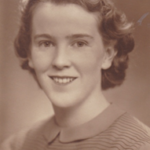Helen Booth WILES MBBS, FRACP, CCH
1941-1946
 Helen Wiles grew up in Sydney’s east and attended secondary school at Ascham in Edgecliff. She was a very bright student and topped her class every year. She achieved “Honours” in 10 subjects in the Intermediate. Although school dux in 1939, her father considered her too young as a 16 year old to go to University, and so she repeated the Leaving Certificate year and again was dux. Helen was awarded a University Exhibition (Commonwealth Scholarship) to study medicine at the University of Sydney.
Helen Wiles grew up in Sydney’s east and attended secondary school at Ascham in Edgecliff. She was a very bright student and topped her class every year. She achieved “Honours” in 10 subjects in the Intermediate. Although school dux in 1939, her father considered her too young as a 16 year old to go to University, and so she repeated the Leaving Certificate year and again was dux. Helen was awarded a University Exhibition (Commonwealth Scholarship) to study medicine at the University of Sydney.
Throughout her secondary school education Helen was exceptionally good at languages – French, German, Latin and ancient Greek. Years later as a doctor, when she had a number of patients whose parents were Italian migrants, she taught herself Italian so she could talk to them about their children’s medical problems.
Helen commenced studies for her degree in Medicine in 1941 and attended the Women’s College at the University of Sydney through until her graduation in 1946. Throughout her University enrolment, in addition to her studies, Helen threw herself into a huge variety of sporting, social and other extracurricular activities. At school she was in the “A” basketball (netball) team and she continued playing in the University of Sydney team from 1942 to 1946 when she was awarded a University “Blue”. Helen was honorary treasurer of the University Women’s Sports Union and a board member of the Women’s Union. At School she was a very keen debater and won the debating prize many times. While at the Women’s College she continued this interest and was involved in many committees including the College House, Sports, Dramatic & Library Committees and sub-editor of the College magazine.
Graduating from the University of Sydney in 1946, Helen did her residency at Parramatta Hospital, followed by terms at Royal Hobart and then the Royal Hospital for Women & Renwick Hospital for Infants in Sydney. Country locums followed. In 1953 she travelled as the ship’s doctor on a small cargo ship from Sydney to South Hampton, England. While in the UK she worked in a number of hospitals as she studied for her FRACP and paediatric degrees, including West Herts Hospital & Stoke Manderville Hospital in Aylesbury. Helen also travelled on the Continent to Italy and France. In 1954 she returned to Australia – again as a ship’s doctor on a small cargo ship.
Back in Australia Helen worked in a number of Children’s Hospitals including Royal Alexandra Hospital for Children and Queen Victoria Hospital in Melbourne. In 1966 she was offered a Neonatal Research Fellowship at the Toronto Hospital for Sick Children in Canada. There she worked on a new method of total blood transfusion for newborns and “blue” babies.
On return to Australia Helen moved to Canberra where she was the first paediatrician to practice there. Helen specialised in the care of newborns and was instrumental in establishing proper neonatal care for the Canberra community and its hospitals. She was a committed supporter of community organisations including the Canberra Mothercraft Society and the QE II family centre for mothers and babies. Helen had a private paediatric practice and was an honorary paediatrician at the Canberra and Woden Hospitals.
When Helen turned seventy, by the law of the day, she was forced to retire from her practice (this restriction was later removed). Undeterred Helen did paediatric locums in country Australia and New Zealand and also took the opportunity to make several trips overseas including a paediatric conference in Mexico City, a visit to the Tajmahal at dawn in India and a brief trip to Thailand.
Throughout her life Helen lived quietly, some would say frugally, but generously supported many charities, especially those involved with the care of children. Helen really enjoyed the Jindalee Aged Care Residence in Canberra where she spent her last seven years. Never having enjoyed any domestic chores, she could devote herself to “more important issues”. She regularly submitted letters to the editor of the Canberra Times newspaper concerning issues she was passionate about. Many of these letters were published. She was particularly interested in the rights of refugees and especially disapproved of treatment of children in detention.
In some ways Helen was a dreamer. She wrote very good poems from the early age 8 through to her mid-teens, many of which were printed in the Sydney Morning Herald newspaper. At school she regularly won the prize for the best contribution to the school magazine. Her busy professional life interfered with poetry writing but she rekindled this interest at Jindalee Aged Care where she organised a poetry reading group amongst some of the residents. In 2015 she self-published a small book of poems from her childhood years.
Helen never married. She was much loved and admired by her sister, Elizabeth, and her ten nieces & nephews. She was highly respected by her medical colleagues and other associates in Canberra. At her request her body was donated to medical science.
Obituary provided by David Phipps
Vale 1 May 2019



